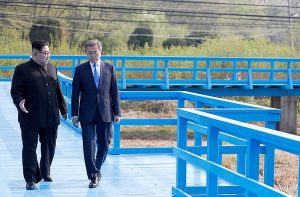Nobody, of course, wants to see North Korea’s nuclear weapons stockpile grow. Yet neither should we discount the importance of deterrence in the Kim regime’s calculations or understate Pyongyang’s respect for it.
Since at least October 2006, when Kim’s father, Kim Jong-il, ordered the country’s first underground nuclear weapons test, North Korea has been a nuclear weapons power. Fourteen years later, the Kim dynasty is a menace internally but has proven to be quite rational in how it deals with Washington. Kim, like his father and grandfather before him, understands that the only thing more reckless for his country’s security than catering to Washington’s denuclearization demand is actually using his nuclear weapons.
What is motivating Kim to announce “new” nuclear weapons policies? Diving into Pyongyang’s inner thinking is always a fraught exercise. Even the most experienced and well-respected North Korea scholar is often left embarrassed when their predictions don’t pan out.
What we can say with reasonable confidence, however, is that North Korea — like other states — is sensitive to its immediate environment and crafts policy based on its own unique geopolitical circumstances.
The North is often euphemistically described as a “shrimp among whales,” a decrepit, poverty-stricken country at the mercy of larger powers in its neighborhood. While the description can be overplayed at times, it’s not wrong.
Wedged between neighbors that are militarily, economically, and diplomatically superior to his own, Kim has been dealt a bad hand of cards. The North’s economy is a paltry mess with a GDP per capita approximately 1/25th the size of South Korea, which boasts a $1.6 trillion economy and one of the region’s most sophisticated (and U.S.-trained) militaries. Pyongyang’s relationship with Japan, a wealthy U.S. ally whose defense budget has increased annually for the last 7 years (Tokyo’s $48.6 billion defense budget for Fiscal Year 2020 was a record high), is as adversarial as it has ever been. China, a so-called ally of North Korea, is in reality a fair-weather friend that has turned the screws on the North’s economy when the situation demands it. Indeed, the U.N. Security Council’s sanctions on the Kim regime wouldn’t be as stringent (at least on paper) as it is today if it weren’t for Beijing’s willingness to support it.
In sum, North Korea is an isolated country without any reliable friends, surrounded by neighbors — two of whom, China and Russia, possess 6,690 nuclear weapons between them — that won’t think twice about throwing Pyongyang overboard and whose principal adversary (the United States) accounts for nearly 40 percent of the world’s military expenditures and is a superpower in every sense of the word.
Getting any country facing such an environment to eliminate its established nuclear deterrent would be a diplomatic miracle — doubly so with North Korea, obsessed with self-preservation and led by a man equally obsessed with his own longevity. With the United States and Russia less than 10 months away from seeing the last nuclear guardrail between them expire and ultra-nationalists in China recommending a three-fold increase in Beijing’s own nuclear arsenal, Pyongyang’s current position is far from rosy.
If U.S. policymakers continue to push North Korea to denuclearize, they will continue to be sorely disappointed.
The alternative is clear: instead of doing the same thing over and over again and expecting a different result, Washington should embrace reality and recognize that denuclearization on the Korean Peninsula is at best a long-term objective that will take decades to achieve — assuming it’s achievable at all.
U.S. policy on North Korea is broken and in desperate need of repair. It can start by treating denuclearization as a second-tier priority and elevating peace on the Korean Peninsula as the immediate objective over the short and medium term.
Peace, or at least a dialogue between Washington, Seoul, and Pyongyang heading in that direction, will minimize the prospects of a conflict nobody wants and inject a degree of predictability and understanding now lacking. Rather than obstructing South Korean President Moon Jae-in’s inter-Korean initiatives,
The United States should also establish bilateral communication channels with the North that go beyond the top-down, leader-to-leader exchanges President Trump and Chairman Kim have participated in. While those exchanges serve a purpose and helped kickstart nuclear negotiations in 2018, U.S.-North Korea relations as a whole are essentially prefaced on an informal, personal relationship between two specific individuals. Dialogue should be normalized, which will require both Washington and Pyongyang to realize that they will receive far more out of the relationship by meeting each other halfway than they would by recycling fantasy demands.
Denuclearization will have to wait. Peace, however, doesn’t have to.
Daniel R. DePetris is a fellow at Defense Priorities and a columnist at the Washington Examiner.

































